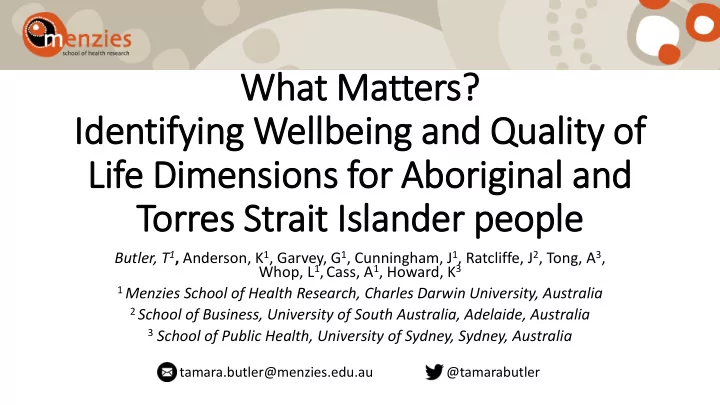

What Matters? Id Identify fying Wellbeing and Quality of Lif ife Dim imensions for Aboriginal and Torres Strait Is Isla lander people Butler, T 1 , Anderson, K 1 , Garvey, G 1 , Cunningham, J 1 , Ratcliffe, J 2 , Tong, A 3 , Whop, L 1 ,Cass, A 1 , Howard, K 3 1 Menzies School of Health Research, Charles Darwin University, Australia 2 School of Business, University of South Australia, Adelaide, Australia 3 School of Public Health, University of Sydney, Sydney, Australia tamara.butler@menzies.edu.au @tamarabutler
Acknowledgement We acknowledge the Gadigal people of the Eora nation as custodians of the land on which we meet today and pay our respects to Elders, past, present, and emerging. We acknowledge the Aboriginal and Torres Strait Islander people present today.
Background & Aim • Indigenous Australians’ understandings of health and wellbeing differ from those of other Australians. • Wellbeing is viewed as holistic, multi-dimensional, and often contingent on not only individual’s wellbeing but their community’s wellbeing. • Conventional PROMs may not capture wellbeing domains relevant to Indigenous Australians • Limits the ability for measures to provide a culturally appropriate assessment of patient outcomes Aim To identify wellbeing domains relevant to Indigenous Australians
Method • Articles that focused on Aboriginal and/or Torres Strait Islander adults and described at least one identifiable dimension/domain of wellbeing in general (non-disease specific) settings. • Wide range of articles were included
Search, Selection and Data Extraction Academic databases, Search terms relating grey literature, to “Indigenous Title and abstract handsearch, Google Australians” and review via Covidence Scholar “wellbeing” Remaining articles Full text imported Coding structure and divided between two into NVivo Thematic Analysis reviewers
Results Family and community Culture, Mental health spirituality, and identity Physical Country health Wellbeing Education Basic Needs Autonomy, Work, roles, empowerment, and recognition responsibilities
Results Culture, Family & spirituality community & identity • Strength of Indigenous identity • Commonly noted as most emerges through culture and important domain spirituality • Provides social capital and • Practicing culture strongly connection associated with positive wellbeing Ongoing impacts of colonisation and government policies disrupts connection and undermines wellbeing
Results Autonomy, Country empowerment, recognition • Profoundly important against a • Holistic, multi-dimensional backdrop of colonisation, concept including more than marginalisation and trauma land • Agency and choice in decisions • Sense of belonging to the land from individual to national level, • Restorative and builds resilience including self determination Ongoing impacts of colonisation and government policies disrupts connection/control and undermines wellbeing
Results Mental Physical health health Collectivist and holistic understandings of mental and physical health • SEWB • Poor health related to poor wellbeing • Circularity of term as domain of • Caused by disempowerment due to wellbeing continued dispossession and cultural dislocation • Often paired as “health and wellbeing”
Results Basic Work, roles and Education needs responsibilities • Food security • Benefits of working for • Tension between Aboriginal community- formal schooling and • Money to meet basic controlled groups and maintaining cultural living need organisations education and • Good quality housing • Wellbeing benefits from knowledge • Equitable access to work involving culture services • Cultural, community and familial roles such as Elders
Conclusions • Identified a wide range of wellbeing domains potentially important to Indigenous Australians • Domains range far beyond those typically measuring in QOL and HRQOL instruments • Identifying these domains takes steps toward constructing a culturally-appropriate wellbeing and PROM instruments
Study team Investigators • Professor Kirsten Howard (University of Sydney) • Professor Gail Garvey (Menzies School of Health Research) • Professor Julie Ratcliffe (University of South Australia) • Associate Professor Allison Tong (University of Sydney) • Professor Joan Cunningham (Menzies School of Health Research) • Professor Alan Cass (Menzies School of Health Research) • Dr Lisa Whop (Menzies School of Health Research) Project Managers : Dr Kate Anderson and Dr Tamara Butler Project Staff: Mr Brian Arley, Ms Alana Gall, Mr David Copley NHMRC Project Grant 1125434. Duration of funding: 2017 - 2021
Recommend
More recommend